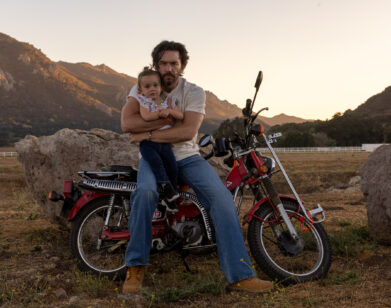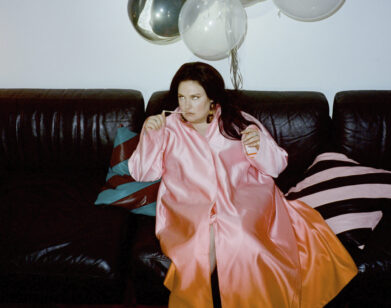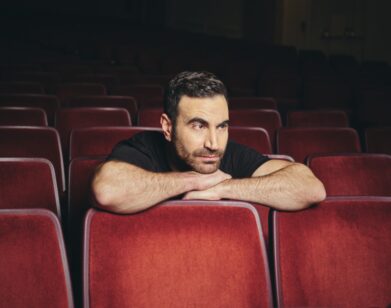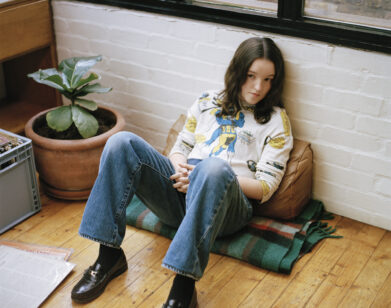The Mobster and the Shrink
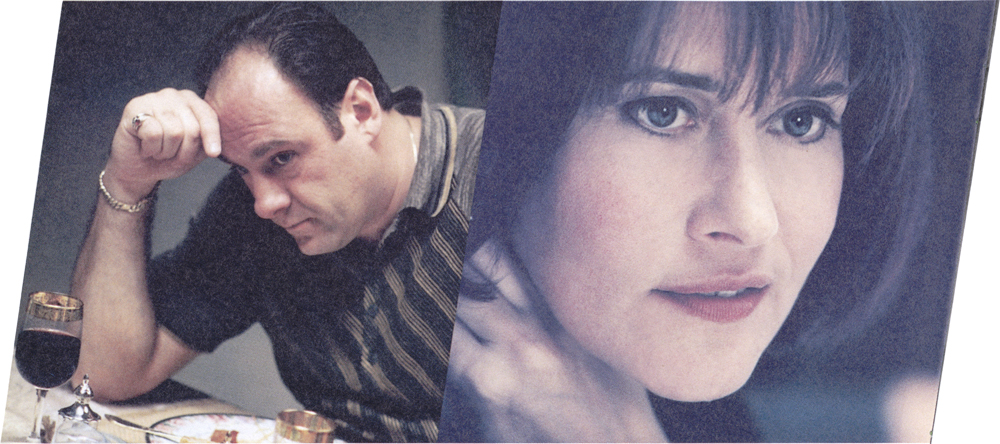
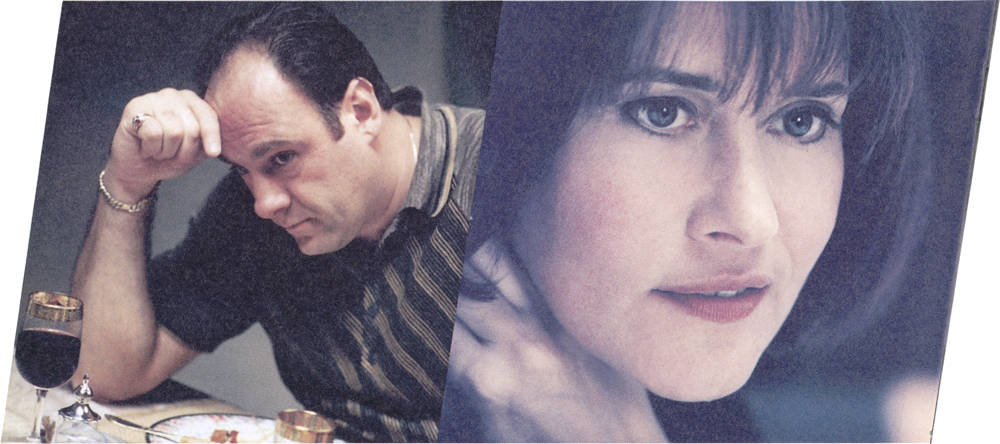
The domestically troubled mobster in HBO’s The Sopranos does what no screen don ain’t never done before—he voluntarily goes to see a therapist, and a female one at that. Here, the stars of the series, James Gandolfini and Lorraine Bracco, talk about its slant on the Mafia mythos and Italian-Americanism from the March 1999 issue of Interview.
In HBO’s hit series, The Sopranos, James Gandolfini plays Tony Soprano, a New Jersey Mob boss torn between two families: one that used to be called La Cosa Nostra; and another—the one at home—that could simply be called dysfunctional. Having concluded that he’s in the midst of a midlife crisis, Tony does what we’ve seen no screen mobster do before—he goes into therapy. His doctor, Jennifer Melfi, is played by Lorraine Bracco, best known for her role as Mafia wife Karen Hill in Martin Scorsese’s GoodFellas (1990).
Created by David Chase (who also brought I’ll Fly Away to network TV in 1991), The Sopranos is being hailed by critics for the originality of its concept and the strength of its writing and acting. For Bracco, it signals a return to the public eye after several years’ absence, durinc which she focused on smaller projects and exec-produced a documentary (It Ain’t Love, 1997) on dating violence, with her husband, Edward James Olmos. For Gandolfini, one of the movies’ most respected character actors, the initial success of The Sopranos spells breakthrough, but one tinged with discomfort. Gandolfini has long avoided the limelight, but it seems to have sought him out. Whether it remains a glow or turns to a glare depends on whether The Sopranos (airing through April 4) lives up to its early promise. Here, Bracco and Gandolfini tell us what the show means to them.
———
LORRAINE BRACCO: I have friends who are already nutty about the show. Have you gotten phone calls from people you haven’t talked to in a long time?
JAMES GANDOLFINI: Some, yeah.
BRACCO: They were like, “I love this!” It’s so weird.
GANDOLFINI: It’s struck a chord for some reason. I thought it would be a little too weird, but people dig it.
BRACCO: It’s that infatuation with the Mafia.
GANDOLFINI: No, I think it’s smart writing. I think, if anything, Sopranos resembles a Mob movie like Donnie Brasco [1997] ’cause it shows the family life.
BRACCO: One thing I read about The Sopranos is that it’s like a continuation of Goodfellas. And, in a way, that’s true. The whole thing about Goodfellas was that in showing Karen and the kids and all that, it was much more than the stereotypical mama-in-the-kitchen kind of Mafia film. Part of The Sopranos, too, is that is shows the—
GANDOLFINI: Humanization.
BRACCO: —humanization. Thank you so much. And also, as an Italian-American woman—which I’m very proud to be—I like that in The Sopranos you come from one side of the block, I come from the other. You know, who’s to say what goes on in everybody’s household? I could have personally, myself, Lorraine Bracco, very easily married into the Mob in Long Island and all of that. And, in a way I have. [laughs]
GANDOLFINI: You ain’t lying. [laughs] Probably more so than others.
BRACCO: I’ll tell you one thing: I could never have played Tony’s wife. It would have depressed me. I think Edie [Falco] does such a great job in that part. I am so impressed with her talent. She doesn’t even know how good she is. I sobbed when I saw her talking to the priest in the college episode. It was so good, so true and so real and pure and honest, that it hurt. I wanted to stand up in my bed and scream, “Bravo!”
GANDOLFINI: I told David, “We have a thoroughbred here. You better give her a lot to do.”
BRACCO: You know who else I think is brilliant? Nancy [Marchland, who plays Livia Soprano, Tony’s widowed mother].
GANDOLFINI: Yeah, she just lets me have it.
BRACCO: Well, what’s so incredible for a Mob show is you’re totally surrounded by strong women. None of us are wusses, that’s for sure. Even Meadow [Tony’s teenage daughter, played by Jamie Lynn Sigler].
GANDOLFINI: Oh, I know. Tony just sits there and is completely abused by women. It’s very much like my life. [laughs] Yeah, the women are very strong. They’re almost like… you know, like Lady Macbeth. They get into more trouble than the men in a lot of ways.
BRACCO: Do you think the show will hurt Italian-Americans?
GANDOLFINI: No.
BRACCO: Do you think that now we’ve totally deglamorized the Mafia and made it so human it will never be the same again in the movies?
GANDOLFINI: No.
BRACCO: I just wonder what John Gotti thinks of the show.
GANDOLFINI: I’m not sure they get HBO in—
BRACCO: —in Marion, Illinois? [laughs] Don’t you like that I even know where John Gotti is?
GANDOLFINI: You should give him a call. You know, I had no interest in doing the dapper don kind of deal in The Sopranos. I know that’s a part of the Mafia thing and I think a lot of those gentlemen are like that, but human frailty and confusion are what interest me. The more sensitive the character and the more he’s in touch with things, the more confusion there is. People who just bludgeon everything as they go along, that’s easy to do.
BRACCO: But that’s the complexity of the whole character, Jimmy: Tony comes from that sensitive, trying-to-find-out, lovely part of you, but he also has that other side.
GANDOLFINI: Well, I don’t know if this is part of an Italian’s makeup, but there was a show called The Italian Americans [1998] that talked about Italians as perfectionists. I think a lot of Italians are like that—that’s what makes them so angry about things. But the reason I think the show has done well is that we did it well. I mean, it talks about humans. It’s not like, “Look at these Italians,” you know? It’s “Look at these people,” because of their families. Everyone’s got a daughter like Meadow, I don’t care who you are.
BRACCO: I have two of them.
GANDOLFINI: Yeah. Who probably give you shit like Meadow does her folks. And everyone’s got a problem with their mother.
BRACCO: Is it true that when you read the script for The Sopranos, you turned to your girlfriend of the time and said, “I’ve just read the role I was born to play, but I’ll never get it”?
GANDOLFINI: I think my exact words were, “I could kick this guy right in the ass, but I’ll never get cast. They’ll hire some fucking pretty boy.” I thought they’d hire, you know, one of these Irish-looking guys who are all over TV now. So I was shocked when I got the part.
“Human frailty and confusion are what interest me. The more sensitive the character and the more he’s in touch with things, the more confusion there is. People who just bludgeon everything as they go along, that’s easy to do.” —James Gandolfini
BRACCO: I’ve seen you in other things but the first time you stopped me was in She’s So Lovely [1997]. I went back to the credits—”Who the fuck is this guy?”
GANDOLFINI: I’ve seen you in a million things. And I couldn’t believe when they got you for this part. I was like, “Oh, man. Fucking great. Cheers.”
BRACCO: [laughs] But do you think I was wrong in taking the part?
GANDOLFINI: No. Why?
BRACCO: I’d said to David, “Would you consider meeting me for Melfi, ’cause I’ve done the Mob wife [referring to her role in Goodfellas] and I’m afraid that I can’t do it better.” And I’m a different girl now.
GANDOLFINI: I couldn’t play another thug. It’s the same kind of thing. Not to sound like a pretentious ass, but if you don’t do something different, you don’t grow. If you don’t challenge yourself, then you don’t find anything interesting.
BRACCO: You want to know something about The Sopranos that shocked me?
GANDOLFINI: No.
BRACCO: It was when you guys go to that naked bar place. I was like, “Oh my God!”
GANDOLFINI: The titty bar?
BRACCO: Yeah, I was horrified.
GANDOLFINI: Why?
BRACCO: It’s like I forgot that that was how men are.
GANDOLFINI: You need to get out more often. What are you talking about?
BRACCO: Why are men like that?
GANDOLFINI: Because it makes you feel like a… I don’t know.
BRACCO: What does it give you? Testosteroni? What?
GANDOLFINI: [laughs] Yeah, Testosteroni, kinda like a pasta.
BRACCO: What? What is it?
GANDOLFINI: Um, I don’t know. I guess it’s a safe place to look at women.
BRACCO: I’m trying to zero in here on the fact that I’m 44 years old, and I was shocked.
GANDOLFINI: You act like everyone goes there once a week.
BRACCO: In the series you go there once a week.
GANDOLFINI: Well, Silvio [a member of Tony’s crew, played by Stevie Van Zandt] owns the place. Why did Tony pick a woman psychiatrist?
BRACCO: Why?
GANDOLFINI: Because any chance of getting in someone’s pants, he will go for.
BRACCO: Oh, really?
GANDOLFINI: Uh-huh.
BRACCO: Is that a part of your like, you know…
GANDOLFINI: Hang on, let’s not confuse the character with me. I am, personally, very chaste. Very, um, against premarital sex. And in many ways, you know, very pure. Ask my wife.
BRACCO: When I forget my lines, you’re always helpful and conciliatory. What do you really feel underneath?
GANDOLFINI: I wanna wring your fucking neck. [laughs] I wanna take you like a rabbit and just twist your head off.
BRACCO: What do we think about the violence in the show?
GANDOLFINI: I thank God for it. Otherwise the show should be called Mafia Crybaby.
BRACCO: I like that.
GANDOLFINI: Mafia Wiener.
BRACCO: Were there aspects of the writing you weren’t comfortable with?
GANDOLFINI: They wanted me to wear a tutu.
BRACCO: When?
GANDOLFINI: And do an interpretative dance about the meaning of—
BRACCO: You mean like Swan Lake?
GANDOLFINI: Yeah.
BRACCO: Bullshit!
GANDOLFINI: You’re right.

